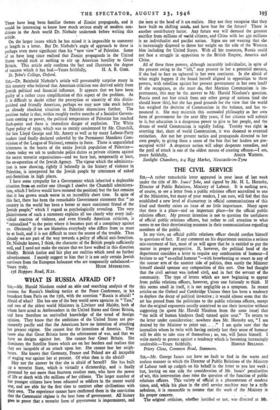WHAT IS RUSSIA AFRAID OF ?
SIR,—Mr. Harold Nicolson ended an able and searching analysis of the reasons for Russia's blocking tactics at the Peace Conference, in his broadcast from Paris on the 13th, with the assertion "Russia is afraid! " Afraid of what? She has one of the best world news agencies in " Tass," and two of the ablest world Ministers in Litvinov and Maisky, both of whom have acted as Ambassadors in the United States and Great Britain, and have therefore an unrivalled knowledge of the trend of foreign opinion. They know that the ambitions of the United States are per- manently pacific and that the Americans have no intention of attacking her present regime. She cannot fear the intentions of America. They know also that Great Britain hates the arbitrament of war, and that we have no designs against her. She cannot fear Great Britain. She dominates the Satellite States which are on her borders and realises that they are incapable of an attack upon her. She cannot fear her neigh- bours. She knows that Germany, France and Poland are all incapable of waging war against her at present. Of what then is she afraid?
May not the answer be that she is afraid of herself? She has built up a terrorist State, which is virtually a dictatorship, and is finally governed by not more than fourteen resolute men, who have the power of life or death with 18o millions of her citizens. The larger number of her younger citizens have been educated as soldiers in the recent world war, and are able for the first time to contrast other civilisations with their own. The experience cannot have confirmed them in the conviction that the Communist regime is the best form of government. All history goes to prove that a terrorist form of government is impermanent, and the men at the head of it are realists. May not they recognise that they have built on shifting sands, and have fear for the future? There is another contributory factor. Any future war will demand the greatest sacrifice from millions of world citizens, and China with her 45o millions is an individualist and pacifist nation. Signs are not wanting that she is increasingly disposed to throw her weight on the side of the Western bloc including the United States. With all her resources, Russia could not face a struggle in opposition to the British Empire, America and China.
All of these three powers, although incurably individualist, in spite of the present swing to the " left," may present to her a potential menace, if she had to face an upheaval in her own continent. Is she afraid of what might happen if she found herself aligned in opposition to these powers, with rebellion against her present government in her own land? If she recognises, as she must do, that Mandan Communism is im- permanent, this may be the answer to Mr. Harold Nicolson's question. Russia need not fear attack from any other group of nations (and she should know this), but she has good grounds for the view that the world has weighed the doctrine of Communism in the balance, and has re- nounced it. She may maintain this outmoded philosophy as her own form of government for the next fifty years, if her citizens will submit to it, but education is a dangerous power to give to her people, and the dream of world Communism is rapidly fading. Trotsky was right is asserting that, short of world Communism, it was doomed to eventual extinction. Are not her present tactics and propaganda directed to her own people, to giving them a sense of the fear that her leaders are pre- occupied with? A desperate nation will adopt desperate remedies, and the peril of attack is one of the oldest means of creating offence.—I am,


























 Previous page
Previous page